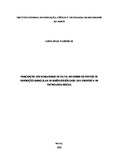Percepção dos moradores de Natal-RN sobre os pontos de deposição irregular de resíduos sólidos: uma proposta de tecnologia social

Visualizar/
Data
2023-04-27Autor
Vanderlei, Luíza de Sá
http://lattes.cnpq.br/0585383275194145
Metadado
Mostrar registro completoResumo
The city of Natal-RN has more than 600 Points of Irregular Deposition of Solid Waste (PDIRS) in its streets, even counting on a household collection that serves 98.90% of the city, above the national average. These sites are cataloged and classified by the City Hall by a Waste Deposition Magnitude Index, which verifies the conditions of the site and its environmental aspects. In this context, the objective of this study was to investigate the environmental perception of the residents of several neighborhoods of Natal-RN in relation to the PDIRS to propose a Social Technology (ST) that supports the participation and shared responsibility of the population in the elimination of these points. The research is of an applied nature, using a quantitative-qualitative approach, carried out with a primary data collection instrument through a structured questionnaire and on-site observation. We interviewed 120 residents by intentional sampling in 24 areas, which were determined proportionally from the amount of PDIRS in each administrative region of the city. Subsequently, an action-research was carried out for the application of the technological product. The results showed that 70.8% of the interviewees recognize the PDIRS as an environmental problem, more than 80% identify the waste with economic value, regardless of the level of education, 63.3% already separate the recyclables, either for delivery to selective collection or donation to autonomous collectors. The main problems identified are related to health such as diseases and proliferation of vectors. In general, the population is unaware of legal regulations, such as the national solid waste policy and the environmental education law, but is collaboratively for actions to improve the reality of irregular areas, with the participation of the city hall or with other neighbors. In summary, the study enabled the construction of a Social Technology, being verified during its application the increase in the perception related to the PDIRS in the area worked with a team of participants, as well as the socio-environmental participation of the community in the accomplishment of the action.



